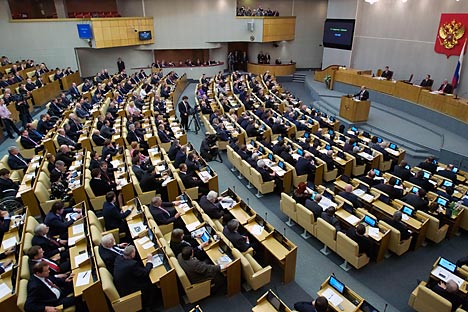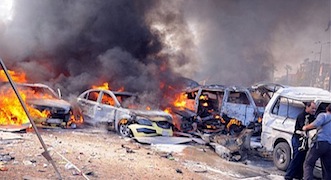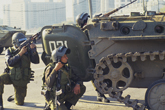Proposed Russian law targets terrorists’ families

New bill forces terrorists’ relatives to pay compensation for attacks. Source: AP
The families of convicted terrorists may have their assets confiscated if new proposals that have passed the first hearing in the Russian parliament become law. Experts say that collective responsibility measures would be counterproductive. Many argue that corrupt officials, rather than terrorists, should be the prime target of such initiatives.
In late September, Russian President Vladimir Putin introduced new anti-terrorism legislation to the lower chamber of the Russian parliament. Under the proposed amendments to the existing laws, the government will set up a mechanism to check the origins of assets owned by “terrorists’ families and close relatives, as well as other people they care about due to close personal relations.”
If the checks uncover sufficient reasons to believe that the assets in question were acquired through terrorist activities, those assets will be confiscated and used to pay compensation to victims of terrorist attacks.
The families of suspected terrorists will have to face questions only if and when the suspect has been convicted, and once the court ruling has entered into force. In the event of suicide attacks, positive identification and DNA testing of the terrorist's body will most likely be considered sufficient evidence.
Vladimir Osechkin, a member of the Council for Public Controls at the Russian Duma, says that the proposed legislation requires a broad public debate involving experts and human rights activists.
"I believe that corrupt officials represent just as great a threat to the Russian state," Osechkin says. “Similar checks can be made into the origins of the assets owned by their families. If we take the proposed legislation in this direction, it is sure to win broad public support. We should use a comprehensive approach to this matter.”
Osechkin also insists that, before the new legislation can be passed, it should be scrutinized for any potential violations of constitutional rights.
There are also worries that a hastily conducted investigation could mete out an unjust punishment to the families of those convicted on terror charges. Maryam Akhmatova is the head of the Mothers of Kabardino-Balkaria for Civil Rights and Liberties nongovernmental organization.
Related:
Russians are still afraid of terrorist acts - poll
Will U.S. and Russia increase anti-terror cooperation before Sochi?
Her son is facing charges in connection with a terrorist attack in Nalchik, southern Russia, in 2005. She believes that, given the current state of the Russian law-enforcement system, the proposals must not be allowed to become law.
“I disagree with the amendments, because the investigation is almost always superficial. There is no proper body of evidence, there is only the version the law-enforcement agencies insist on. This law could hit hard many people who never did the things they are accused of,” Akhmatova said in an interview with the BigCaucasus news website.
Alexander Cherkasov, head of the Memorial human rights group, points out that no new laws are actually required to confiscate ill-gotten gains. "The question is: Does the new legislation target only ill-gotten assets, or any assets owned by the terrorists' relatives? This must not become some form of collective punishment meted out to people who may have had no idea what their brother or uncle were up to," says Cherkesov.
“Such collective punishment is actually what the terrorists do. That was the excuse Basayev used when he took hostages; he wanted to take revenge on all Russians. Such a law would drag us back to the Stone Age.”
Cherkasov also predicts that if passed, the new legislation will provide fertile ground for corruption.
“To illustrate, we already have a law that allows the government not to release the bodies of dead terrorists to their families. The people who have the power to decide whether the deceased is a terrorist or not can well be persuaded to pronounce the deceased a law-abiding citizen and release his body in return for a bribe. The proposed new amendments also have a lot of potential to fuel corruption. Besides, it would be a mistake to think that terrorists are kindly people who are going to worry about the relatives they leave behind," says the NGO head.
Cherkasov believes that stripping the terrorists’ families and relatives of their assets would be a spectacular PR move, but a very ineffective deterrent.
Sergei Goncharov, the former head of the Alfa special task force, echoes these views. He insists that the proposed amendments still require a lot of work by legal specialists. “The proposals contain some legal terms that simply defy any formal justification,” Goncharov says. “For example, who exactly is covered by the term ‘in-law relatives?’"
The former Alfa chief also believes that such a cavalier approach to justice would trigger an even greater outbreak of violence in the North Caucasus: "Whether or not assets are ill-gotten is up to courts to decide. The idea is not intrinsically flawed, but the amendments should not be passed in their current form.”
These worries notwithstanding, the proposed legislation does have its advocates. Andrei Epifantsev, an expert in Caucasian affairs, argues that collective responsibility is actually part of the Caucasian tradition.
“I support these amendments; there is plenty of evidence that such measures can be the most effective deterrent in the collectivist communities of the Caucasus. Such communities aid and abet terrorists purely on the collectivist principles: In other words, they believe that the terrorist is always right because he is one of them," says Epifantsev. “So, if that’s what happens, the community must be held responsible for it.”
“Experience during the war in the Caucasus, as well as experience in Israel, shows that these are the right methods to use,” the expert says. “Even the practices used by the president of the Chechen Republic, Ramzan Kadyrov, are more effective than a liberal approach to people who espouse completely different values and principles.”
“Kadyrov used to meet the families of the rebels, and tell them: ‘Guys, if your son is out there in the mountains with a gun in his hands, you are not going to get any compensations, or education, or any decent jobs.’ And, as a result, these families made their sons come back from the mountains. Some of them would completely abandon the insurgency and become law-abiding citizens; others merely left Chechnya for neighboring provinces. But, as soon as people come to realize that they will be personally worse off because of some individual members of their community, they stop giving shelter and protection to those members,” says Epifantsev. “The government must demonstrate that it means what it says.”
All rights reserved by Rossiyskaya Gazeta.
Subscribe
to our newsletter!
Get the week's best stories straight to your inbox


